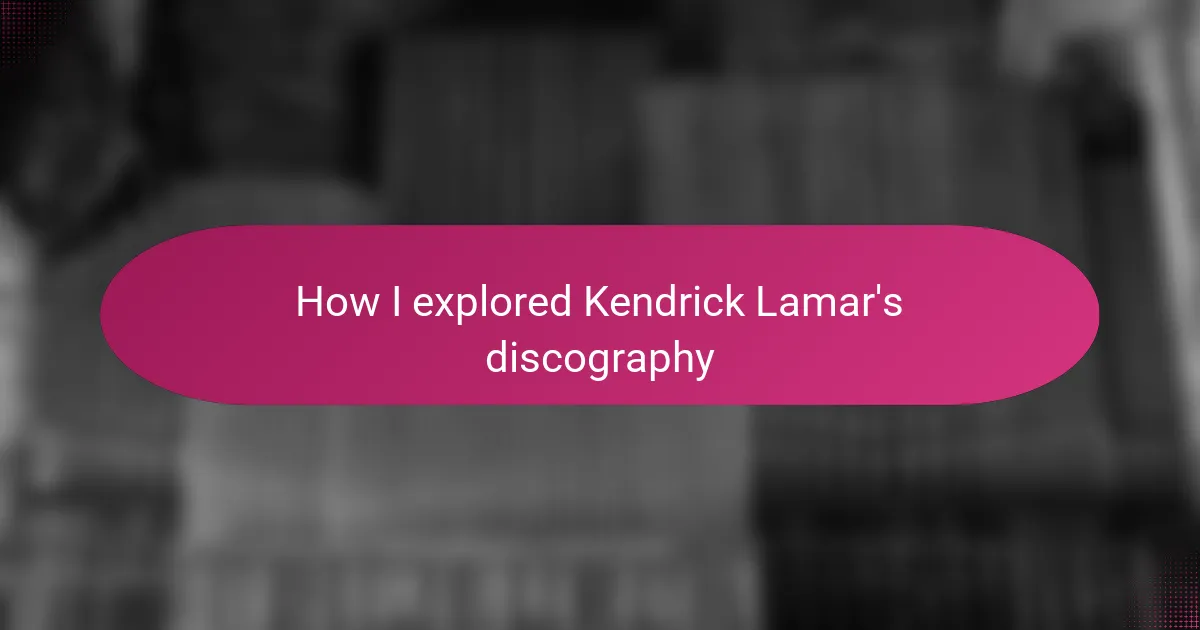Key takeaways
- Kendrick Lamar’s music uniquely blends storytelling, jazz, funk, and hip-hop, creating immersive soundscapes that resonate with listeners.
- His albums showcase a progression in both artistic skill and personal themes, tackling issues like social justice and identity with vulnerability and authenticity.
- Kendrick’s influences range from West Coast hip-hop legends to jazz and literary traditions, reflecting the depth and intentionality of his lyricism.
- Listening to his discography can be a transformative experience, revealing complex layers and fostering a deep personal connection to his themes.
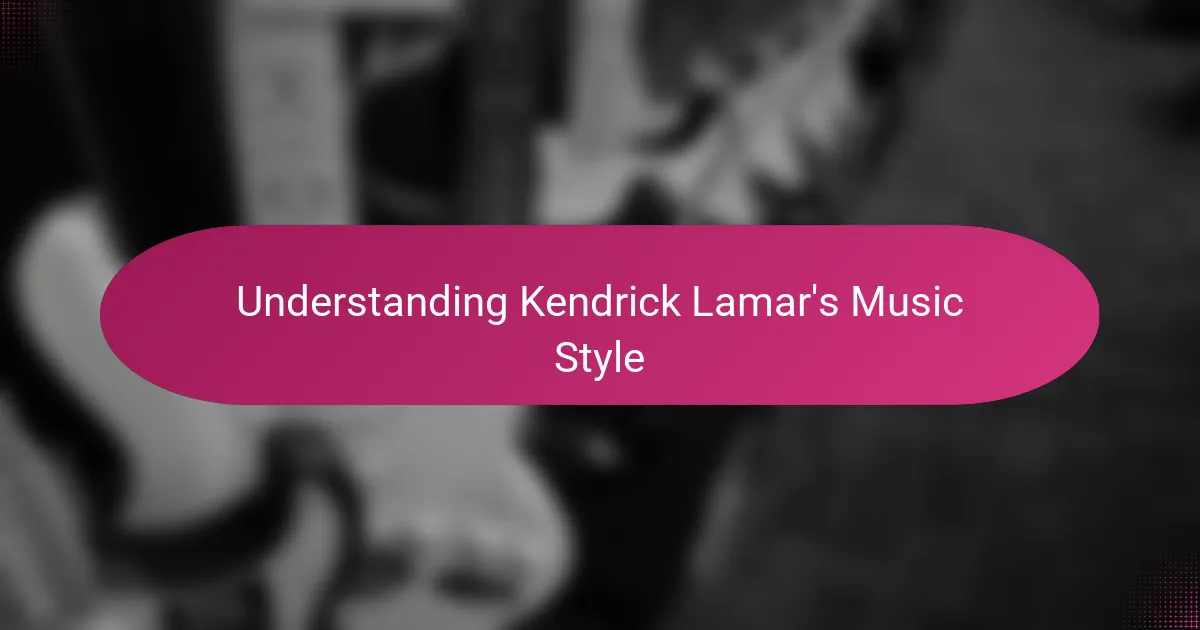
Understanding Kendrick Lamar’s Music Style
Kendrick Lamar’s music style strikes me as a brilliant fusion of storytelling and raw emotion. His ability to weave complex narratives with vivid imagery always pulls me in, making each song feel like a chapter in a larger story. Have you ever gotten lost in his lyrics so deeply that it felt like you were living his experiences alongside him?
What stands out most to me is how Kendrick blends various elements of jazz, funk, and traditional hip-hop to create something uniquely his own. Listening to his tracks, I often find myself appreciating not just the words but the mood and atmosphere he crafts through beats and rhythms. It’s like he’s not only telling a story but painting a soundscape you can feel.
I also notice how Kendrick’s flow constantly shifts—sometimes rapid and urgent, other times slow and contemplative—keeping me on my toes. This dynamic approach mirrors the themes he explores, from social justice to personal struggle, making his music feel both intellectually stimulating and deeply personal. Don’t you think that’s why his style resonates so powerfully with so many listeners?
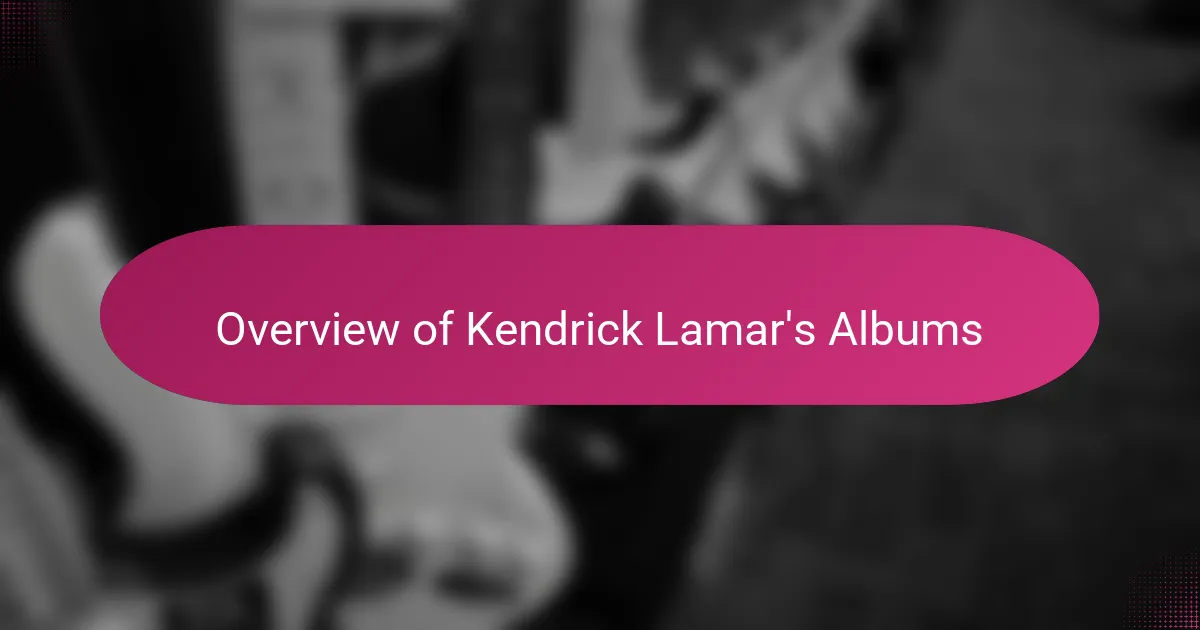
Overview of Kendrick Lamar’s Albums
Kendrick Lamar’s albums each tell a different part of his story, and I’ve always found that journey fascinating to follow. From the raw energy of “Section.80” to the cinematic depth of “To Pimp a Butterfly,” his albums feel like evolving chapters in a deeply personal diary. Have you noticed how every album brings a fresh sound, yet there’s always that unmistakable Kendrick touch tying it all together?
When I first dove into “good kid, m.A.A.d city,” I was struck by its narrative structure—it almost felt like a movie playing out in my mind, complete with vivid characters and unforgettable scenes. Then, with “DAMN.,” Kendrick took a more introspective turn, layering complexity that challenged me to listen closely and think critically about themes like fate and identity. It’s like each album invites you to unpack something new every time you hit play.
What truly amazes me is Kendrick’s fearless experimentation—whether it’s blending jazz and funk or incorporating spoken-word poetry. His discography doesn’t just showcase growth in skill; it reflects a maturing artist unafraid to confront societal issues and, more importantly, himself. Have you found an album where Kendrick’s message spoke directly to something in your own life? For me, that connection is what keeps his work endlessly engaging.
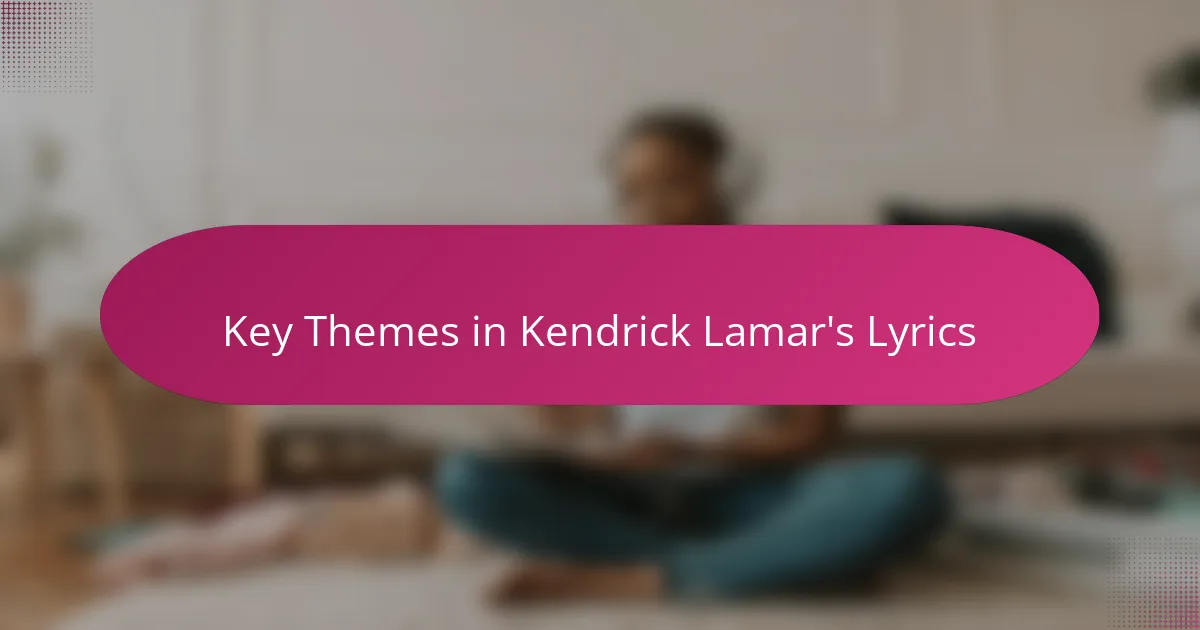
Key Themes in Kendrick Lamar’s Lyrics
Kendrick’s lyrics dive deep into themes like racial identity, systemic injustice, and personal empowerment. When I first really listened closely, I remember feeling both challenged and inspired—as if he was handing me a mirror reflecting complex truths about society and myself. Have you ever had a song make you question the world and your place in it all at once?
Another theme I keep coming back to is vulnerability. Kendrick isn’t afraid to lay bare his fears, doubts, and inner conflicts, which makes his music feel so authentic to me. It’s like hearing a close friend share their most private thoughts, and that honesty pulls me in every single time.
What I find truly remarkable is how he balances pain with hope, weaving stories that acknowledge struggle but also celebrate resilience and growth. It makes me wonder: how many artists can make social commentary that feels this personal and poetic? For me, that’s the magic behind Kendrick’s words—they engage my mind and touch my heart simultaneously.
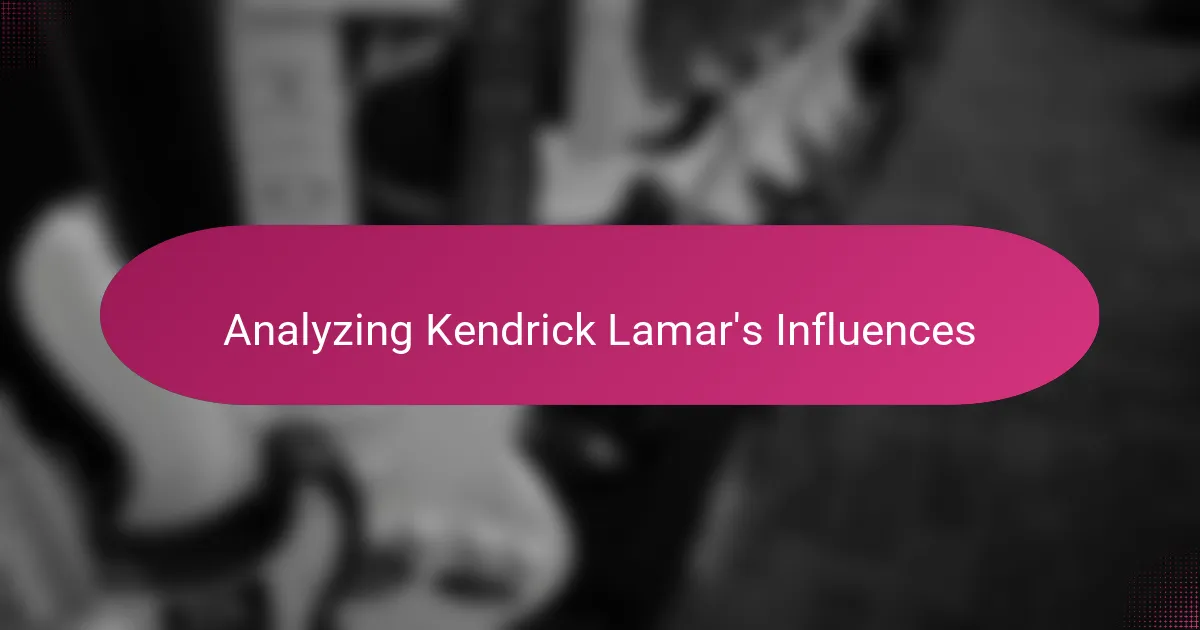
Analyzing Kendrick Lamar’s Influences
When I first started tracing Kendrick’s influences, I was struck by how deeply rooted his sound is in the legacy of West Coast hip-hop legends like Dr. Dre and Tupac. It feels like he’s standing on the shoulders of giants but isn’t afraid to carve his own path. Have you ever noticed how his beats sometimes echo those classic vibes yet feel completely fresh and urgent?
What fascinates me even more is his embrace of jazz and funk icons such as Miles Davis and George Clinton. I’ve often thought about how those soulful, improvisational elements seep into Kendrick’s music, giving it that layered, textured feel that keeps me coming back. It’s not just sampling for the sake of sound—it’s like he’s channeling a whole cultural conversation through his tracks.
Then there’s the influence of literary and spoken-word traditions, which adds a unique depth to his storytelling. I remember reading interviews where Kendrick mentions poets and activists who inspire him, and it made me realize how intentional his lyricism truly is. Do you think that blend of musical and intellectual influences is what makes his work resonate so powerfully across different audiences? For me, it’s a big part of his genius.
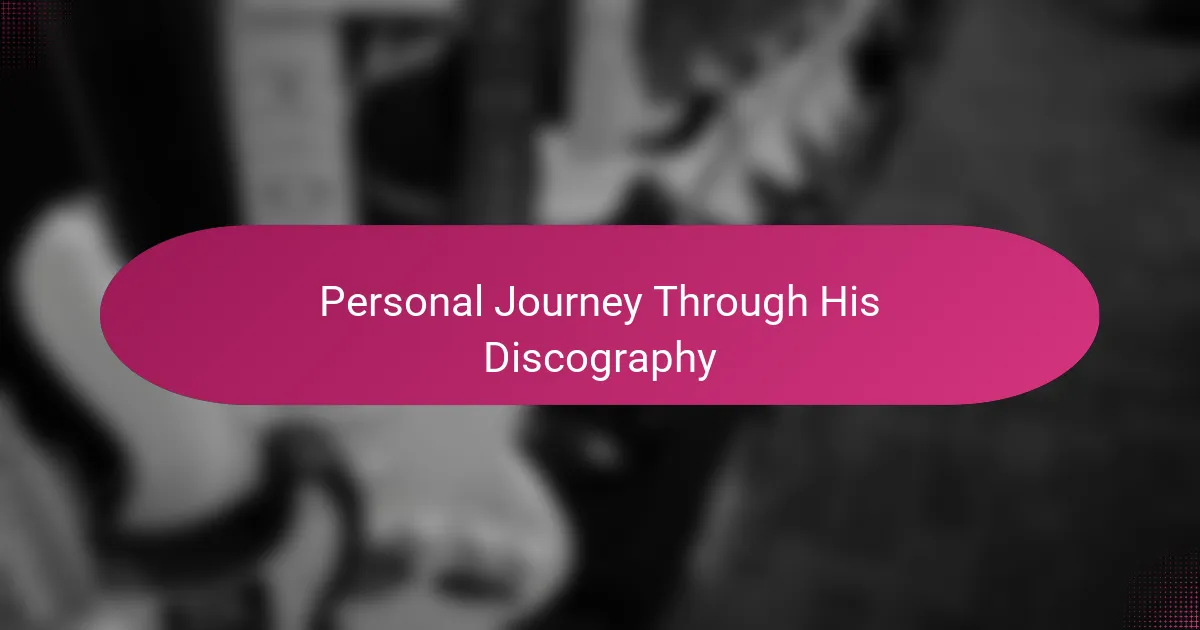
Personal Journey Through His Discography
I remember the first time I sat down and listened to Kendrick’s entire discography straight through—it was like embarking on a deeply personal journey with him. Each album felt like peeling back another layer of his psyche, revealing raw emotions and stories I hadn’t encountered before. Have you ever experienced an artist whose work feels so intimate that it almost changes how you see yourself?
What struck me most was how my understanding of Kendrick’s music evolved over time. Early on, I was drawn to the beats and catchy hooks, but as I delved deeper, I started to grasp the complexities of his themes—family, struggle, faith—and how they mirrored parts of my own life. It made me appreciate not just the artistry but the courage it takes to be so vulnerable on such a public stage.
There were moments during that exploration when certain songs hit me in unexpected ways—sometimes uplifting, sometimes painfully honest. For instance, revisiting “Alright” during a challenging phase in my life gave me a sense of hope I hadn’t felt before. Have you ever found a track that became more than just music, turning into a source of strength or reflection? That’s what Kendrick’s discography offered me—a soundtrack to my own evolving story.

Insights Gained From Listening Experience
Listening closely to Kendrick’s discography, I realized how much his music demands active engagement rather than just background noise. Each listen revealed new layers—whether a subtle lyric, an unexpected sample, or a shift in tone—that kept me hooked and made me appreciate the craft behind every track. Have you ever experienced a song that slowly unfolds its meaning over time, rewarding your patience and attention?
One insight that stayed with me is how Kendrick uses his music as a form of dialogue—not just with listeners but with himself and society. It felt like being invited into a conversation full of vulnerability, questioning, and sometimes frustration, yet always rooted in hope. That dynamic made me reflect on my own beliefs and challenges, pushing me to think beyond the surface.
What truly struck me was the emotional range he covers—from anger and despair to celebration and healing—all within a single album or even a single song. This spectrum of feeling made me realize how music can be a powerful tool for empathy and connection. Have you ever felt that a song captured exactly what you were going through, even when words failed you? Kendrick’s work has done that for me more than once.
